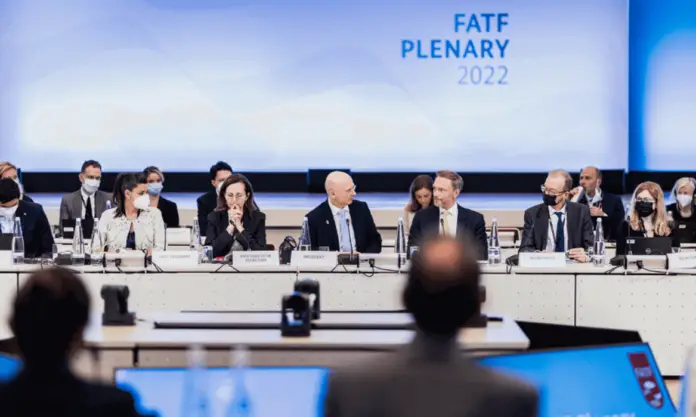By Dr. Ikramul Haq and Abdul Rauf Shakoori
In this entire scenario, if we look at Pakistan’s compliance with FATF’s 40 recommendations, our level of effectiveness was ranked low on 10 immediate outcomes, while medium on one immediate outcome which pertains to international cooperation. Pakistan failed to obtain a substantial or high level of effectiveness for any of the immediate outcomes. Now if we compare this with FATF parameters for placing countries in the list of jurisdictions with increased monitoring and analyzing it with our current compliance level, Pakistan still needs to work hard for the satisfaction of FATF’s action plan.
According to FATF standards jurisdiction would be reviewed when: it does not participate in FATF-styled regional body (FSRB) or does not allow mutual evaluation results to be published promptly; or it is nominated by an FATF member or an FSRB. The nomination is based on specific money laundering, terrorist financing, or proliferation financing risks or threats coming to the attention of delegations; or it has achieved poor results on its mutual evaluation, specifically: it has 20 or more non-Compliant (NC) or Partially Compliant (PC) ratings for technical compliance; or It is rated NC/PC on three or more of the following: recommendations: 3, 5, 6, 10, 11, and 20; or it has a low or moderate level of effectiveness for 9 or more of the 11 Immediate Outcomes, with a minimum of two lows: or it has a low level of effectiveness for six or more of the 11 Immediate Outcomes.
Though Pakistan has addressed issues about mutual evaluations and technical compliance, yet the performance of our compliance related to effectiveness measures does not qualify us to be placed back on the white list. Our current laws and regulations do not meet international standards. Pakistan Financial Monitoring Unit’s independence seems to be compromised. Former federal minister for finance and economic affairs Senator Muhammad Ishaq Dar made it an autonomous body through a notification. It now works under the supervision of the General Committee comprising government cabinet secretaries that limits its independence. Further, the previous coalition government of the Pakistan Tehreek-i-Insaf (PTI) tried to regulate it through different committees such as the National Executive Committee (NEC) having ministers qualifying as politically exposed people and considered high risk majority of whom are facing corruption charges.
The General Committee (cabinet secretaries), and the Financial Monitoring Unit (FMU) receive suspicious transaction reports and at the same time work under the influence of the General Committee. Secondly, the role of various statutory regulatory bodies might come under question as well as it tantamount to conflict of interests. Similarly, regulations related to Designated Non-Financial Businesses and Professions (DNFBP) are not aligned with the international standards. The FATF team might show its concerns and ask for their revision as well. Moreover, FATF has not given us a clean chit regarding the compliance of terrorist financing investigations and prosecutions, targeting senior leaders and commanders of the UN-designated terrorist groups but called it a positive upward trend in the number of money laundering investigations and prosecutions being pursued in Pakistan, in line with country’s risk profile.
Pakistan needs to work on dismantling the financial support of these individuals and organizations by introducing strict procedures for raising any type of donations/funding. Pakistan also needs to improve its risk profile, the policy concerning AML-CFT framework, and coordination among intelligence institutions to counter the creation, movement, and penetration of those illicit funds in our financial system. We need to improve international cooperation so that the support to follow illicit money and criminals can be sought by passing and sharing critical information and exchanging financial intelligence to facilitate action against criminals and their assets. We also need to improve supervisory regime in the light of concerns highlighted in the mutual evaluation report 2019 for financial institutions and DNFBPs. The supervisor should make sure that both sectors are applying preventive measures according to their risk profile and timely reporting suspicious transactions.
Also, Pakistan should improve its financial intelligence, operation of legal persons and arrangements, money laundering investigations, and prosecutions about which concerns have been shown by the Asia Pacific Group (APG) mutual evaluation implying doubts on our judiciary’s understanding about the AML-CFT matters. All these actions require sincere efforts and continuous monitoring by a skilled workforce. Pakistan can only achieve the required objectives if its AML-CFT framework is operating according to global standards coined by FATF. Evaluation will become a tough call for Pakistan, as FATF’s presidency is transferred to Singapore. Moreover, this evaluation will be based on the personal judgment of FATF members (most probably APG will form a team to evaluate the effectiveness of our compliance).
It will enhance the role of Foreign Office to improve our relations with the member countries and keep them updated about our progress and efforts in countering illicit flow of funds. Coordinated efforts by all stakeholders [Foreign Office, Interior Ministry, FMU, FATF Secretariat, armed forces, Director General of Military Operation [DGMO], all intelligence agencies, the State Bank of Pakistan, SECP, FBR and others] will hopefully bring us good news in October 2022. [Last part]
Dr Ikramul Haq, advocate of the Supreme Court and member of International Fiscal Association (IFA), is Adjunct Faculty at Lahore University of Management Sciences, member Advisory Board and Visiting Senior Fellow of Pakistan Institute of Development Economics (PIDE); Abdul Rauf Shakoori is a corporate lawyer and an expert in white collar crimes and sanctions compliance. Both the writers have recently coauthored a book, Pakistan Tackling FATF: Challenges and Solutions, with Huzaima Bukhari








Comments are closed.